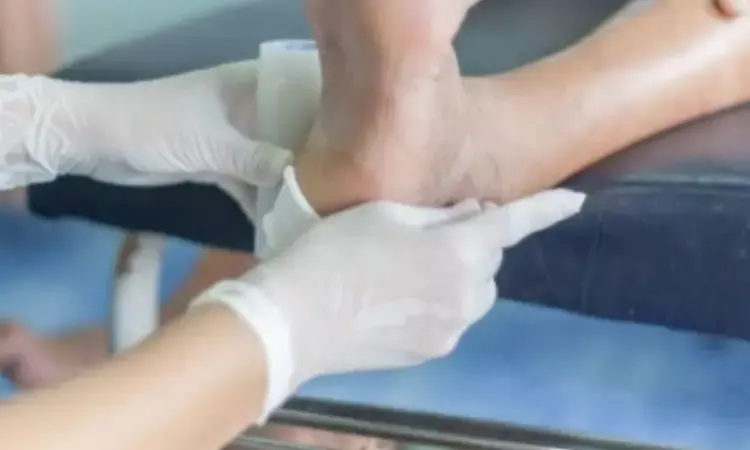- Home
- Medical news & Guidelines
- Anesthesiology
- Cardiology and CTVS
- Critical Care
- Dentistry
- Dermatology
- Diabetes and Endocrinology
- ENT
- Gastroenterology
- Medicine
- Nephrology
- Neurology
- Obstretics-Gynaecology
- Oncology
- Ophthalmology
- Orthopaedics
- Pediatrics-Neonatology
- Psychiatry
- Pulmonology
- Radiology
- Surgery
- Urology
- Laboratory Medicine
- Diet
- Nursing
- Paramedical
- Physiotherapy
- Health news
- Fact Check
- Bone Health Fact Check
- Brain Health Fact Check
- Cancer Related Fact Check
- Child Care Fact Check
- Dental and oral health fact check
- Diabetes and metabolic health fact check
- Diet and Nutrition Fact Check
- Eye and ENT Care Fact Check
- Fitness fact check
- Gut health fact check
- Heart health fact check
- Kidney health fact check
- Medical education fact check
- Men's health fact check
- Respiratory fact check
- Skin and hair care fact check
- Vaccine and Immunization fact check
- Women's health fact check
- AYUSH
- State News
- Andaman and Nicobar Islands
- Andhra Pradesh
- Arunachal Pradesh
- Assam
- Bihar
- Chandigarh
- Chattisgarh
- Dadra and Nagar Haveli
- Daman and Diu
- Delhi
- Goa
- Gujarat
- Haryana
- Himachal Pradesh
- Jammu & Kashmir
- Jharkhand
- Karnataka
- Kerala
- Ladakh
- Lakshadweep
- Madhya Pradesh
- Maharashtra
- Manipur
- Meghalaya
- Mizoram
- Nagaland
- Odisha
- Puducherry
- Punjab
- Rajasthan
- Sikkim
- Tamil Nadu
- Telangana
- Tripura
- Uttar Pradesh
- Uttrakhand
- West Bengal
- Medical Education
- Industry
Early intensive blood sugar control in type 1 diabetes tied to lower risk of diabetic foot ulcers: Study

USA: A recent study in the journal Diabetes Care showed that early intensive glycemic control reduces the long-term risk of diabetic foot ulcers (DFUs) -- the most important antecedent in the causal pathway to lower-extremity amputation (LEAs).
Previous studies have demonstrated that intensive glycemic control reduces the risk of retinal, kidney, and eurologic complications in type 1 diabetes (T1D). However, it is not known if it reduces the risk of lower-extremity complications.
Considering the above, Edward J. Boyko, Veterans Affairs Puget Sound Health Care System, Seattle, WA, and colleagues aimed to examine whether former intensive versus conventional glycemic control reduced the long-term risk of diabetic foot ulcers (DFUs) and lower-extremity amputations (LEAs) among Diabetes Control and Complications Trial (DCCT) participants in the subsequent Epidemiology of Diabetes Interventions and Complications (EDIC) study.
For this purpose, DCCT participants (n = 1,441) were made to complete 6.5 years on average of intensive versus conventional diabetes treatment. Following this, 1,408 were enrolled in EDIC and followed annually over 23 years for DFU and LEA occurrences by physical examination. The researchers also estimated associations of DCCT treatment assignment and time-updated exposures with DFU or LEA using multivariable Cox proportional hazard regression models.
Following were the study's salient findings:
- Intensive versus conventional glycemic control was associated with a significant risk reduction for all DFUs (hazard ratio 0.77) and a similar magnitude but nonsignificant risk reduction for first-recorded DFUs (0.78) and first LEAs (0.70).
- In adjusted Cox models, clinical neuropathy, lower sural nerve conduction velocity, and cardiovascular autonomic neuropathy were associated with higher DFU risk; estimated glomerular filtration rate <60 mL/min/1.73 m2, albuminuria, and macular edema with higher LEA risk; and any retinopathy and greater time-weighted mean DCCT/EDIC HbA1c with higher risk of both outcomes.
"Our results showed that a period of intensive glycemic control early in the course of T1D reduced DFU risk during subsequent long-term follow-up in the DCCT/EDIC cohort," wrote the authors. "To our knowledge, this is the first demonstration of a reduction in DFU risk associated with a randomized intervention to improve glycemic control."
Reference:
Edward J. Boyko, Leila R. Zelnick, Barbara H. Braffett, Rodica Pop-Busui, Catherine C. Cowie, Gayle M. Lorenzi, Rose Gubitosi-Klug, Bernard Zinman, Ian H. de Boer; for the DCCT/EDIC Research Group, Risk of Foot Ulcer and Lower-Extremity Amputation Among Participants in the Diabetes Control and Complications Trial/Epidemiology of Diabetes Interventions and Complications Study. Diabetes Care 1 February 2022; 45 (2): 357–364. https://doi.org/10.2337/dc21-1816
Dr Kamal Kant Kohli-MBBS, DTCD- a chest specialist with more than 30 years of practice and a flair for writing clinical articles, Dr Kamal Kant Kohli joined Medical Dialogues as a Chief Editor of Medical News. Besides writing articles, as an editor, he proofreads and verifies all the medical content published on Medical Dialogues including those coming from journals, studies,medical conferences,guidelines etc. Email: drkohli@medicaldialogues.in. Contact no. 011-43720751


